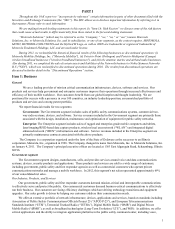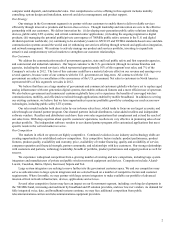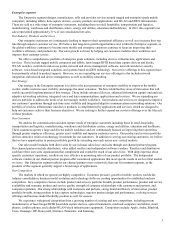Motorola 2012 Annual Report Download - page 18
Download and view the complete annual report
Please find page 18 of the 2012 Motorola annual report below. You can navigate through the pages in the report by either clicking on the pages listed below, or by using the keyword search tool below to find specific information within the annual report.10
when the contracts involve new technology; (ii) financial risks, including the estimates inherent in projecting costs associated
with large, long term contracts and the related impact on operating results; and (iii) political risk, especially related to the
contracts with government customers. In addition, multi-year awards from governmental customers may often only receive
partial funding initially and may typically be cancelable on short notice with limited penalties. The termination of funding for a
government program could result in a loss of anticipated future revenue attributable to that program, which could have an
adverse impact on our profitability.
The expansion of our business into managed services creates new competitors and new and increased areas of risk that we
have not been exposed to in the past and that we may not be able to properly assess or mitigate against.
In July 2011, we announced the formation of our global solutions and services organization. We plan to continue to
expand our business by offering additional and expanded managed services for existing and new types of customers, such as
designing, building, operating, managing and in some cases owning a public-safety system or other commercial system. The
offering of managed services involves the integration of multiple services, multiple vendors and multiple technologies,
requiring that we partner with other systems and services providers, often on multi-year projects. In some cases we must
compete in some business areas with a company with which we have a partnership and, at the same time, cooperate with that
company in other business areas. From time to time such projects may require that we form a joint venture with our partners.
Risks associated with expanding our managed services offerings include:
• We may be unable to recognize revenue from the sale of equipment in connection with managed services contracts for
a period of time, which may be several years.
• We may be required to agree to specific performance metrics that meet the customer's requirement for network
availability, reliability, maintenance and support and, in some cases, if these performance metrics are not met we may
not be paid.
• The managed services business is one characterized by large subcontracting arrangements and we may not be able to
obtain adequate indemnities or other protections from our subcontractors to adequately mitigate our risk to our
customers.
• We are facing increasing competition from traditional system integrators and the defense industry as system contracts
become larger and more complicated.
• Expansion will bring us into contact with new regulatory requirements and restrictions with which we will have to
comply and may increase the costs and delay or limit the range of new services which we will be able to offer.
A portion of our business is dependent upon U.S. government contracts and grants, which are highly regulated and subject to
oversight audits by U.S. government representatives and subject to cancellations. Such audits could result in adverse findings
and negatively impact our business.
Our government business is subject to specific procurement regulations with numerous compliance requirements. These
requirements, although customary in U.S. government contracting, increase our performance and compliance costs. These costs
may increase in the future, thereby reducing our margins, which could have an adverse effect on our financial condition. Failure
to comply with these regulations could lead to suspension or debarment from U.S. government contracting or subcontracting
for a period of time, and the inability to receive future grants. Among the causes for debarment are violations of various laws,
including those related to procurement integrity, export control, U.S. government security regulations, employment practices,
protection of the environment, accuracy of records, proper recording of costs, foreign corruption and the False Claims Act.
Generally, U.S. government contracts and grants are subject to oversight audits by U.S. government representatives. Such
audits could result in adjustments to our contracts or grants. Any costs found to be improperly allocated to a specific contract or
grant may not be allowed, and such costs already reimbursed may have to be refunded. Future audits and adjustments, if
required, may materially reduce our revenues or profits upon completion and final negotiation of audits. Negative audit
findings could also result in investigations, termination of a contract or grant, forfeiture of profits or reimbursements,
suspension of payments, fines and suspension or prohibition from doing business with the U.S. government. All contracts with
the U.S. government are subject to cancellation at the convenience of the U.S. government.
In addition, contacts with government officials and participation in political activities are areas that are tightly controlled
by federal, state and local laws. Failure to comply with these laws could cost us opportunities to seek certain government sales
opportunities or even result in fines, prosecution, or debarment.
We derive a portion of our revenue from government customers who award business through competitive bidding which can
involve significant upfront costs and risks. This effort may not result in awards of business or we may fail to accurately estimate
the costs to fulfill contracts awarded to us, which could have adverse consequences on our future profitability.
Many government customers, including most U.S. government customers, award business through a competitive bidding
process, which results in greater competition and increased pricing pressure. The competitive bidding process involves
























